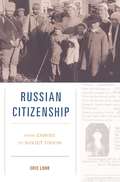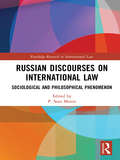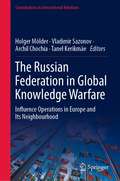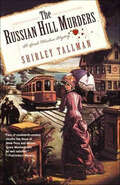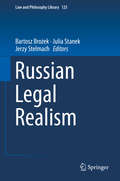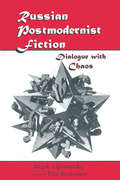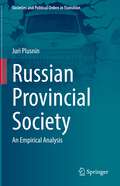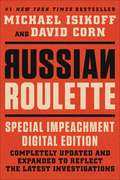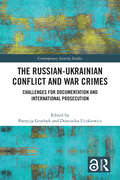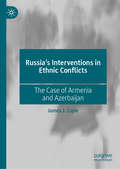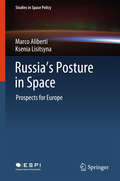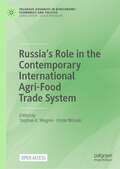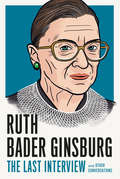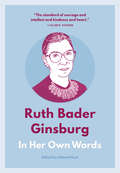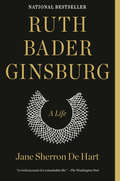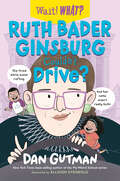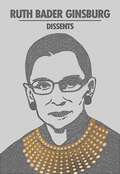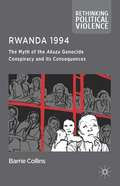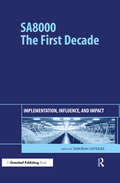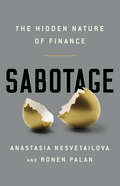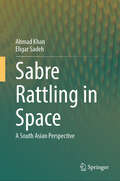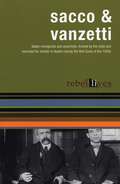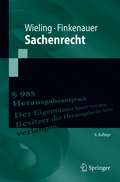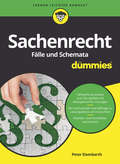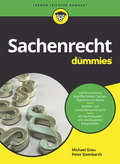- Table View
- List View
Russian Citizenship: From Empire To Soviet Union
by Eric LohrRussian Citizenship is the first book to trace the Russian state’s citizenship policy throughout its history. Focusing on the period from the mid-nineteenth century to the consolidation of Stalin’s power in the 1930s, Eric Lohr considers whom the state counted among its citizens and whom it took pains to exclude. His research reveals that the Russian attitude toward citizenship was less xenophobic and isolationist and more similar to European attitudes than has been previously thought-until the drive toward autarky after 1914 eventually sealed the state off and set it apart. Drawing on untapped sources in the Russian police and foreign affairs archives, Lohr’s research is grounded in case studies of immigration, emigration, naturalization, and loss of citizenship among individuals and groups, including Jews, Muslims, Germans, and other minority populations. Lohr explores how reform of citizenship laws in the 1860s encouraged foreigners to immigrate and conduct business in Russia. For the next half century, citizenship policy was driven by attempts to modernize Russia through intensifying its interaction with the outside world. But growing suspicion toward non-Russian minorities, particularly Jews, led to a reversal of this openness during the First World War and to a Soviet regime that deprived whole categories of inhabitants of their citizenship rights. Lohr sees these Soviet policies as dramatically divergent from longstanding Russian traditions and suggests that in order to understand the citizenship dilemmas Russia faces today-including how to manage an influx of Chinese laborers in Siberia-we must return to pre-Stalin history.
Russian Discourses on International Law: Sociological and Philosophical Phenomenon (Routledge Research in International Law)
by P. Sean MorrisA number of recent events in the last decade have renewed interest in Russian discourses on international law. This book evaluates and presents a contemporary analysis of Russian discourses on international law from various perspectives, including sociological, theoretical, political, and philosophical. The aim is to identify how Russia interacts with international law, the reasons behind such interactions, and how such interactions compare with the general practice of international law. It also examines whether legal culture and other phenomena can justify Russia’s interaction in international law. Russian Discourses on International Law explains Russia's interpretation of international law through the lens of both leading western scholars and contemporary western-based Russian scholars. It will be of value to international law scholars looking for a better understanding of Russia’s behavior in international legal relations, law and society, foreign policy, and domestic application of international law. Further, those in fields such as sociology, politics, philosophy, or general graduate students, lawyers, think tanks, government departments, and specialized Russian studies programs will find the book helpful.
The Russian Federation in Global Knowledge Warfare: Influence Operations in Europe and Its Neighbourhood (Contributions to International Relations)
by Tanel Kerikmäe Archil Chochia Holger Mölder Vladimir SazonovThis book examines Russian influence operations globally, in Europe, and in Russia’s neighboring countries, and provides a comprehensive overview of the latest technologies and forms of strategic communication employed in hybrid warfare. Given the growing importance of comprehensive information warfare as a new and rapidly advancing type of international conflict in which knowledge is a primary target, the book examines Russia’s role in Global Knowledge Warfare. The content is divided into three parts, the first of which addresses conceptual issues such as the logic of information warfare, the role of synthetic media, and Russia’s foreign policy concepts, including the impact of the COVID-19 pandemic on influence operations. The second part analyzes technological, legal and strategic challenges in modern hybrid warfare, while the third focuses on textual, cultural and historical patterns in information warfare, also from various regional (e.g. the Western Balkans, Romania, Ukraine, and the Baltic) perspectives. The book is primarily intended for scholars in the fields of international relations, security and the military sciences who are interested in Russian foreign policy and influence operations, but also their impact on the global security environment.
The Russian Hill Murders: A Sarah Woolson Mystery (Sarah Woolson Mysteries #2)
by Shirley TallmanThough her own San Francisco law firm barely tolerates her, gutsy young attorney Sarah Woolson flouts proper feminine behavior in this nineteenth-century answer to Legally Blonde. While her mother begs her to settle down, her chauvinistic boss tries to come up with ever more spiteful ways to pressure his only female associate into quitting. Naturally, Sarah digs in her heels and vows to retain her position at any cost. Besides, she has no intention of straying too far from the action.When the wife of wealthy society entrepreneur Leonard Godfrey drops dead of an apparent heart attack at a charity dinner for the new Women and Children's Hospital, Sarah's curiosity gets the better of her. But no one will believe in her theory that Caroline Godfrey's death was not natural---until several more people affiliated with the hospital die of inexplicable causes.Meanwhile, when a pregnant widow whose husband has died in a sweatshop fire asks for Sarah's help in finding the owner so that she can sue for recompense, our feisty heroine insists on taking the case against her boss's orders. With the help of her colleague Robert Campbell and an eager young hansom cabdriver named Eddie, Sarah goes on a manhunt for Killy Doyle, the menacing head of the factory underworld. But she can't ignore the mysterious deaths at the Women and Children's Hospital---especially when the hospital's Chinese chef is arrested for the murders and the Chinese community's most powerful Tong Lord asks her to defend him.Faced with her first criminal trial, Sarah stops at nothing to determine the killer's identity. But in trying to exonerate her client, she places her own life in danger. Will Sarah figure out who the murderer is, or will she be the final victim?
Russian Legal Realism (Law and Philosophy Library #125)
by Bartosz Brożek Julia Stanek Jerzy StelmachThis edited volume explores ideas of legal realism which emerge through the works of Russian legal philosophers. Apart from the well-known American and Scandinavian versions of legal realism, there also exists a Russian one: readers will discover fresh perspectives and that the collection of early twentieth century ideas on law discussed in Russia can be understood as a unified school of legal thought – as Russian legal realism. <p><p> These chapters by renowned European and Eastern European legal philosophers add to ongoing discussions about the nature of law, especially in the context of developments around our scientific knowledge about the mind and behaviour. Analyses of legal phenomena carried out by legal realists in Russia offer novel arguments in favour of embracing psychological and sociological perspectives on the law. The book includes analysis of the St. Petersburg school of legal philosophy and Leon Petrażycki’s psychological theory of law. <p> This original and multifaceted research on Russian realists is of considerable value to an international audience. Researchers and postgraduate students of law, legal theory and legal ethics will find the book particularly appealing, but it will also interest those investigating the philosophy or sociology of law, or legal history.
Russian Postmodernist Fiction: Dialogue with Chaos
by Mark Lipovetsky Eliot BorensteinThis text offers a critical study of postmodernism in Russian literature. It takes some of the central issues of the critical debate to develop a conception of postmodern poetics as a dialogue with chaos and places Russian literature in the context of an enriched postmodernism.
Russian Provincial Society: An Empirical Analysis (Societies and Political Orders in Transition)
by Juri PlusninThis book presents a unique analysis of modern Russian provincial society. Based on detailed empirical evidence, it develops a theoretical model of Russian provincial society in the late 20th century and the early 21st century. The book explains how under the conditions of catastrophic changes, Russian provincial societies have undergone a structural transformation. It further sheds light on the transformation of the economic behavior of the population and households with regard to economic practices, crafts, and revived archaic forms of labor behavior. Summarizing the extensive empirical evidence, the book puts forward the concept of complementarity of two social structures at the local level: a ground "soft communal" structure and a "tightening with an iron hoop" estate state structure. Next, it discusses the stability and resistance of the local social structure to external political disturbances. Based on the presented analysis, the book introduces several independent criteria on the basis of which it establishes the typology of all empirically observed forms of societies. Subsequently, the book identifies six main types of Russian provincial societies. It explains how depending on the type, the different societies either adapt to political and economic changes in different ways, stay unchanged or transform their structure. The book will appeal to students, scholars, and researchers of economics, political science, sociology, and anthropology, interested in a better understanding of transformation studies, population and household economics, provincial societies, as well as Russian societal structures.
Russian Roulette: The Inside Story of Putin's War on America and the Election of Donald Trump
by David Corn Michael Isikoff<P>The incredible, harrowing account of how American democracy was hacked by Moscow as part of a covert operation to influence the U.S. election and help Donald Trump gain the presidency. <P>RUSSIAN ROULETTE is a story of political skullduggery unprecedented in American history. It weaves together tales of international intrigue, cyber espionage, and superpower rivalry. After U.S.-Russia relations soured, as Vladimir Putin moved to reassert Russian strength on the global stage, Moscow trained its best hackers and trolls on U.S. political targets and exploited WikiLeaks to disseminate information that could affect the 2016 election. <P>The Russians were wildly successful and the great break-in of 2016 was no "third-rate burglary." It was far more sophisticated and sinister -- a brazen act of political espionage designed to interfere with American democracy. At the end of the day, Trump, the candidate who pursued business deals in Russia, won. And millions of Americans were left wondering, what the hell happened? This story of high-tech spying and multiple political feuds is told against the backdrop of Trump's strange relationship with Putin and the curious ties between members of his inner circle -- including Paul Manafort and Michael Flynn -- and Russia. <P>RUSSIAN ROULETTE chronicles and explores this bizarre scandal, explains the stakes, and answers one of the biggest questions in American politics: How and why did a foreign government infiltrate the country's political process and gain influence in Washington? <P><b>A New York Times Bestseller</b>
The Russian-Ukrainian Conflict and War Crimes: Challenges for Documentation and International Prosecution (Contemporary Security Studies)
by Patrycja Grzebyk Dominika UczkiewiczThis book offers a multidisciplinary examination of the international crimes committed in the Russia-Ukraine War, and the challenges of their prosecution and documentation.As the largest international armed conflict in Europe since World War II, Russia’s war against Ukraine has provoked strong reactions and questions about the post-1945 world order, the utility of the war, and the effectiveness of international criminal justice. Throughout the chapters in this volume, scholars and legal practitioners from Canada, Germany, Poland, Ukraine, the UK, and the United States present the results of interdisciplinary research, insights from the perspective of other post-communist states, and first-hand expertise from directly working on the documentation and prosecution of these crimes. This offers a broader picture of post-Cold War relations and sheds light on the roots and nature of the war and the importance of regional approaches. The chapters also present some possible responses to the crimes committed in the conflict, with a focus on a victims-centered approach to transitional justice.This volume will be of interest to scholars and students of international criminal and humanitarian law, security studies, peace and conflict studies, and Eastern European history.
Russia's Interventions in Ethnic Conflicts: The Case of Armenia and Azerbaijan
by James J. CoyleThis book explores the thirty-year border conflict between Armenia and Azerbaijan, specifically around the former autonomous republic of Nagorno Karabakh, and shows how Russia is the only winner in this conflict: fighting on both sides, supplying arms to both sides, and acting as the arbiter between the two sides. The author looks at Armenia, Azerbaijan and the separatists from military, political, economic and diplomatic perspectives, and offers insights on how the fighting has influenced society, and vice versa. The book provides an update to the history of the war to include major fighting in 2020, and examines how Russia obtained three military bases and most economic assets in Armenia, while becoming Azerbaijan's major weapons supplier to the tune of six billion dollars. It shows how Russia has tried to sideline the internationally-supported Minsk negotiations in favor of Russia assuming the sole role of arbiter, and argues that even though Russia has submitted a number of ceasefire proposals, it does little to encourage the sides to implement them. The book includes a discussion of international law, United Nations Resolutions, and rulings by the European Court of Human Rights.
Russia's Posture in Space: Prospects for Europe (Studies in Space Policy #18)
by Marco Aliberti Ksenia LisitsynaThe book sheds new lights on the evolution of Russian space activities with a focus on their strategy of international cooperation. This analysis is carried out in relation to the evolution of the domestic and international dynamics that have been impacting the country’s direction in space, with the ultimate goal of providing an assessment on their impact for current and foreseeable Europe-Russia space relations. Russia has traditionally been one of the two main strategic partners for Europe in its space endeavor. Hitherto, long-standing cooperation has been nurtured between the two actors in various areas, from scientific research to space transportation and human spaceflight. In recent years, however, a number of endogenous and exogenous developments has triggered significant changes in Russia’s space posture. These changes are evident in the adjustment of Russia’s space policies and programmatic goals, in the restructuring of the domestic space industry as well as in the attitude towards international space partnerships.
Russia’s Role in the Contemporary International Agri-Food Trade System (Palgrave Advances in Bioeconomy: Economics and Policies)
by Stephen K. Wegren Frode NilssenThis Open Access book analyses the emergence of Russia as a global food power and what it means for global food trade. Russia's strategy for food production and trade has changed significantly since the end of the Soviet period, and this is the first book to take account of Russia's rise as a food power and the global implications of that rise. It includes food trade policy and practice, and developments in regional food trade. This book will be of interest to academics and practitioners in agricultural economics, international trade, and international food trade.
Ruth Bader Ginsburg: and Other Conversations (The Last Interview Series)
by Ruth Bader GinsburgThe newest entry in the increasingly popular series collects fascinating and in-depth interviews with Bill Moyers, Nina Totenberg, and more, and conversations (with Antonin Scalia and high school students) from throughout the long, ground-breaking career of one of the greatest, most influential, and most exciting legal minds in American history.From her start in Depression-era New York, to her final days at the pinnacle of the American legal system, Ruth Bader Ginsburg defied convention, blazing a trail that helped bring greater equality to women, and to all Americans. In this collection of in-depth interviews -- including her last, as well as one of her first -- Ginsburg details her rise from a Brooklyn public school to becoming the second woman on the United States Supreme Court, and her non-stop fight for gender equality along the way. Besides telling the story behind many of her famous court battles, she also talks openly about motherhood and her partnership with her beloved husband, her Jewishness, her surprising friendship with her legal polar opposite Justice Antonin Scalia, her passion for opera, and, in one of the collection's most charming interviews, offers advice to high school students wondering about the law. It is, in the end, both an engrossing look into a fascinating life, and an inspiring tribute to an American icon.
Ruth Bader Ginsburg: In Her Own Words (In Their Own Words)
by Helena Hunt&“Like so many cultural icons, Ginsberg has doled out some seriously memorable quotes, thoughts, and observations . . . a quick dip of inspiration.&” —Bustle As one of only nine women in a class of 500 at Harvard Law School when she enrolled in 1956 and one of only four female Supreme Court justices in the history of the United States, Ruth Bader Ginsburg was frequently viewed as a feminist trailblazer and an icon for civil rights. Ginsburg had always been known as a prolific writer and speaker. Now, Ruth Bader Ginsburg: In Her Own Words offers a unique look into the mind of one of the world&’s most influential women by collecting 300 of Ginsburg&’s most insightful quotes. Meticulously curated from interviews, speeches, court opinions, dissents, and other sources, Ruth Bader Ginsburg: In Her Own Words creates a comprehensive picture of Ruth Bader Ginsburg, her wisdom, and her legacy. &“The standard of courage and intellect and kindness and heart.&” —Gloria Steinem
Ruth Bader Ginsburg: A Life
by Jane Sherron de HartThe first full life—private, public, legal, philosophical—of the 107th Supreme Court Justice, one of the most profound and profoundly transformative legal minds of our time; a book fifteen years in work, written with the cooperation of Ruth Bader Ginsburg herself and based on many interviews with the justice, her husband, her children, her friends, and her associates. <P><P>In this large, comprehensive, revelatory biography, Jane De Hart explores the central experiences that crucially shaped Ginsburg’s passion for justice, her advocacy for gender equality, her meticulous jurisprudence: her desire to make We the People more united and our union more perfect. At the heart of her story and abiding beliefs—her Jewish background. Tikkun olam, the Hebrew injunction to “repair the world,” with its profound meaning for a young girl who grew up during the Holocaust and World War II. We see the influence of her mother, Celia Amster Bader, whose intellect inspired her daughter’s feminism, insisting that Ruth become independent, as she witnessed her mother coping with terminal cervical cancer (Celia died the day before Ruth, at seventeen, graduated from high school). <P><P> From Ruth’s days as a baton twirler at Brooklyn’s James Madison High School, to Cornell University, Harvard and Columbia Law Schools (first in her class), to being a law professor at Rutgers University (one of the few women in the field and fighting pay discrimination), hiding her second pregnancy so as not to risk losing her job; founding the Women's Rights Law Reporter, writing the brief for the first case that persuaded the Supreme Court to strike down a sex-discriminatory state law, then at Columbia (the law school’s first tenured female professor); becoming the director of the women’s rights project of the ACLU, persuading the Supreme Court in a series of decisions to ban laws that denied women full citizenship status with men. <P><P> Her years on the U.S. Court of Appeals for the District of Columbia Circuit, deciding cases the way she played golf, as she, left-handed, played with right-handed clubs—aiming left, swinging right, hitting down the middle. Her years on the Supreme Court . . . A pioneering life and legal career whose profound mark on American jurisprudence, on American society, on our American character and spirit, will reverberate deep into the twenty-first century and beyond.
Ruth Bader Ginsburg Couldn't Drive? (Wait! What? #0)
by Dan GutmanFrom the best-selling author of My Weird School: a new entry in the cheerful and engaging biography series centered on high-interest historic figures. Did you know that Ruth Bader Ginsburg failed her driving test five times? Or that her real name was Joan? Bet you didn’t know that she liked paddle boarding, white water rafting, and riding elephants! She even had a praying mantis named after her. Siblings Paige and Turner have collected some of the most unusual and surprising facts about one of the most famous Supreme Court Justices in history, from her childhood to her rise as the superstar Notorious R.B.G. Narrated by the two spirited siblings and animated by Allison Steinfeld’s upbeat illustrations, Ruth Bader Ginsburg Couldn’t Drive? is an authoritative, accessible, and one-of-a-kind biography infused with Dan Gutman’s signature zany sense of humor.
Ruth Bader Ginsburg Dissents (Word Cloud Classics)
by Ruth Bader GinsburgA collection of key dissenting and majority opinions from U.S. Supreme Court justice Ruth Bader Ginsburg.During her 27 years as an associate justice on the U.S. Supreme Court, Ruth Bader Ginsburg became well known for her strongly worded dissenting opinions against the decisions of the conservative majority. Ginsburg was a fierce supporter of women&’s rights whose personal experiences helped shape her into a feminist icon who employed logical, well-presented arguments to show that gender discrimination was harmful to all members of society. Ruth Bader Ginsburg Dissents features 15 legal opinions and briefs, including majority and dissenting opinions that Ginsburg drafted during her time on the U.S. Supreme Court and briefs from her career before she was appointed to the court in 1993.
Rwanda 1994
by Barrie CollinsThrough a rigorous critique of the dominant narrative of the Rwandan genocide, Collins provides an alternative argument to the debate situating the killings within a historically-specific context and drawing out a dynamic interplay between national and international actors.
SA8000: Implementation, Influence, and Impact
by Deborah LeipzigerThis is the first book in the field of corporate social responsibility to examine the progress of a standard over a ten-year period. Published in late 1997 and revised in 2001, the Social Accountability 8000 (SA8000) standard and verification system is a comprehensive tool aiming to assure humane workplaces throughout the supply chain. The SA8000 system includes: factory-level management system requirements for ongoing compliance and continual improvement; independent, expert verification of compliance by certification bodies; the involvement of all key stakeholders in the SA8000 system; and harnessing consumer and investor concern by helping to identify and support companies that are committed to assuring human rights in the workplace. As of 31 December 2007, nearly 700,000 workers were employed in 1,500 facilities certified to SA8000, in 65 countries and 67 industrial sectors.Ten years on, what has the impact of SA8000 been and how do its architects and users see it developing into the future? In this book, businesses, NGOs, academics and trade union leaders provide much-needed perspective on the lessons learned from SA8000 and set an agenda for the next decade. The book also provides context on the leading initiatives within the field of CSR (such as ISO 26000 and the Business for Social Compliance Initiative) and how they relate to SA8000. The book features case studies on the experiences of a wide range of companies, including Gucci, The GAP, Chiquita, TNT, Tata and Otto Versand, and on many of the most innovative programmes in the field of CSR, such as the Made-By label. Analysts from emerging economies provide valuable insights into how SA8000 has become a key tool in Brazil and India. The book addresses many of the key themes for corporate responsibility such as traceability, supply chain management and transparency.SA8000: The First Decade provides insights for company managers, NGOs, policy-makers and trade union leaders on how to implement a social standard and will be required reading for any manager seeking to implement SA8000 or any other code of conduct or standard for their suppliers.Deborah Leipziger is well known for her book The Corporate Responsibility Code Book, published in 2003 and considered to be one of the key reference books in the field of CSR. SA8000: The First Decade is an extension of Ms Leipziger's work over a 17-year career in the field of CSR, in which she has played a role in the development of many social standards, including SA8000 and the Ethical Trading Initiative, and advised many others.
Sabotage: The Hidden Nature of Finance
by Ronen Palan Anastasia NesvetailovaI don't like the word 'sabotage',"--a former Goldman Sachs trader admitted. "It's just harsh.... Though, frankly, how else do you make money in this business...I mean, real money."The fundamental motive for financial innovation is not to make the system work better, but to avoid regulation and oversight. This is not a bug of the financial system, but a built-in feature. The president of the US is not a tax avoider because he is an especially fraudulent financier; he's a tax avoider because he is a wealthy man in a system premised on such deceit. Finance is an industry of sabotage. This book is a brilliant, intellectual detective story that traces the origins of financial sabotage, starting with the work of a prescient American economist who saw the capacity for banks and businesses to dissemble and profit as early as the 1920s. What was accomplished modestly in the first half of the 20th century became a booming global industry in the 1980s. Financialization took over everything, culminating in instruments so complex and confusing their own creators were being destroyed by them in 2008. With each financial bust, people expect to hear who the culprit was, and cynically know to not expect much punishment to ever reach them. But the innovation of this book is to show that each individual gaming the system isn't a crook---the whole system is sabotage.
Sabre Rattling in Space: A South Asian Perspective
by Ahmad Khan Eligar SadehThis book offers historical and theoretical context of the path followed by States, from space militarization to weaponization, and deconstructs traditional security paradigm myths to prove that a paradigm shift has been brought because of deadly space weapons developed by major space powers. It reconciles that the strategic distrust between two leading space competitors, U.S. and China, has prompted them to pursue counter-space capabilities. The ripple effect of this troubling relation in space is not limited at the global level, but has witnessed a trickledown effect on regional security. In relation to this, the book offers details of the Indian space program including its military space ambitions, and provides information about Pakistan’s objectives in space. It offers an overview of challenges to international space governance and how the structural flaws help states to aggressively follow a path toward space weaponization. Additionally, it discusses the UN negotiating arms control measures in space and the politics of states not to negotiate prevention of an arms race in outer space. The book is a useful contribution to space security, from both traditional and contemporary approaches, covering history, theory, and application. It provides an academic as well as practical approach carrying appeal for professionals, experts, opinion makers, industry, academics, teachers, policy makers, politicians and masses from other walks of life who are interests in space security.
Sacco and Vanzetti (Rebel Lives)
by John Davis Nicola Sacco Bartolomeo VanzettiPolitical activists Nicola Sacco and Bartolomeo Vanzetti were framed and executed for murder in a wave of anti-immigrant hysteria in Boston in the 1920s. Their story is a salutary one, illustrating the way in which anarchists and immigrants were painted as terrorists -- a grim reminder of the consequences of using fear as a political weapon. Eventually pardoned in 1977 by Governor Dukakis, Sacco and Vanzetti's case sparked an unprecedented international defence campaign backed by writers, artists, politicians and musicians. It remains one of the most famous political trials in history.
Sachenrecht: Sachen, Besitz Und Rechte An Beweglichen Sachen (Springer-Lehrbuch)
by Hans Josef Wieling Thomas FinkenauerDas Sachenrecht ist ein zentraler Bereich der zivilrechtlichen Examensvorbereitung. Der Autor vermittelt alle mit dem Recht der beweglichen Sachen sowie dem Grundstücksrecht in Verbindung stehenden Prinzipien auf Grundlage der historischen Entwicklung in systematischem Zusammenhang: auf studentische Bedürfnisse zugeschnitten und mit Argumentationshilfen für die jeweiligen Gründe. Anspruchsvolle Anfänger und Fortgeschrittene erhalten hier eine hervorragende Unterstützung, den schwierigen Stoff anschaulich und tiefgehend zu bewältigen. Der Autor hat das Buch überarbeitet und dem aktuellsten Stand der Rechtsprechung und Literatur angepasst.
Sachenrecht Fälle und Schemata für Dummies (Für Dummies)
by Peter EisenbarthDie Fallbearbeitung ist für viele Jura-Neulinge eine harte Nuss. Da hilft nur eins: üben! Nach einer kurzen Einführung in die Fallbearbeitung mit vielen hilfreichen Tipps bietet Ihnen dieses Buch Übungsfälle zum Sachenrecht mit ausführlichen Lösungen zur Selbstkontrolle. Arbeiten Sie sich Schritt für Schritt vom Sachverhalt und der Fallfrage zur Lösungsskizze und zum Gutachten. Außerdem stellt Ihnen Peter Eisenbarth die relevanten Schemata vor, sodass Sie schnell einen Überblick über das Mobiliar- und Immobiliarrecht gewinnen.
Sachenrecht für Dummies (Für Dummies)
by Michael Grau Peter EisenbarthWas ist der Unterschied zwischen Eigentum und Besitz? Warum setzt man im Alltag ein Gebäude mit Immobilie gleich, obwohl nach dem Gesetz das Grundstück (bebaut oder unbebaut) die Immobilie verkörpert? Wie wird das Eigentum übertragen? Wussten Sie, dass bewegliche und unbewegliche Sachen ähnliche, im Detail aber andere Rechtsstrukturen haben? Diese und viele andere Themen werden Ihnen von Michael Grau (Mobiliarsachenrecht) und Peter Eisenbarth (Immobiliarsachenrecht) verständlich erklärt. Anschauliche Beispiele und Grafiken, die Sie nur in diesem Buch finden, bringen zusätzlich Leben in das Thema Sachenrecht.
